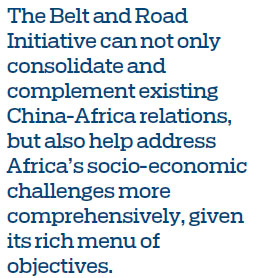African countries should embrace the Belt and Road Initiative as it aligns well with their development aspirations
Collaboration between Africa and China, through the Forum on China-Africa Cooperation and the China-Africa Think Tanks Forum, among others, has gained momentum and triggered much interest. This is because China is playing an increasingly prominent role in global trade, investment, finance and governance. But the deepening engagement between China and Africa also extends to diplomatic and cultural relations, as evidenced by the establishment of Confucian Institutes in a number of African countries with a view to promoting people-to-people exchanges.
The Belt and Road Initiative can not only consolidate and complement existing China-Africa relations, but also help address Africa's socio-economic challenges more comprehensively, given its rich menu of objectives. Taking into consideration Africa's development challenges and the attendant aspirations to address them, Africa's political leadership should view the Belt and Road Initiative as a means to promote connectivity, industrialization, the development of agriculture and provision of finance to boost inter - and intra-trade.
It should be noted that the Belt and Road Initiative has two important characteristics: It is holistic and achieving its goals leads to realizing others. For example, pursuing connectivity by provision of the requisite infrastructure will not only enhance and upgrade regional and global trade, but also improve the investment climate of the partner countries. Subsequently, the improved investment climate will in turn attract foreign direct investment flows to countries, a critical vehicle for industrialization.
Ultimately, the aim is for this to culminate in sustainable transformation of countries in terms of poverty reduction, environmental sustainability and inclusive social development. This virtuous cycle is a clear indication of the uniqueness of the initiative. African countries should embrace the initiative to tackle its wide ranging development challenges.
Indeed, Africa's development challenges are enormous. First, 70 percent of the world's poor are located in Africa. about 600 million Africans live without electricity and depend on biomass sources for energy, such as wood and charcoal, which harm the environment. And 37 percent of world's population who lack access to clean water globally live in Africa.
Second, the African continent is the least industrialized region in the world and its accessibility to global value chains is the lowest. Agriculture, which is the mainstay of the continent's economy and the source of livelihood for over 64 percent of the population, has the lowest productivity in the world.
Third, Africa is home to 16 landlocked countries and the transport infrastructure is underdeveloped so connectivity is very poor. As a consequence, intra-regional trade is, at 17.7 percent, the lowest in the world.
Last, the continent performs poorly in mobilizing domestic financial resources. Africa's development aspirations, aimed at addressing the above challenges, are clearly stipulated in a number of planning frameworks at continental, regional and national levels, such as the African Unio's Agenda 2063; regional economic communities' development agendas, such as the industrialization plan of the East African Community and that of Southern African Development Community; and national development visions, coupled with the five-year development plans of various countries. These frameworks are complemented by global development frameworks, such as the UN's Sustainable Development Goals.
A closer look at the content of the Belt and Road Initiative shows that it has a component for addressing each of the challenges facing Africa. This being the case, it is time for Africa's leaders to seize the opportunity and ensure African countries are key stakeholders in the initiative. The experience of China-Africa cooperation in the last few decades has clearly shown that China is trustworthy and a non-wavering development partner, and one that consistently adheres to regionally or globally set principles and agreements, such as those of the Bandung Conference (1955), the United Nations and the World Trade Organization.

Further, experience shows that those who have already joined the initiative in Africa, and beyond, have already benefited enormously from it. This being the case, Africa should seek to engage with the initiative as its development aspirations are well aligned with it.
However, in order for the alignment to be effective, African policymakers and decision-makers should, first and foremost, make an assessment of the conditions of their respective countries. This will provide the information on existing and required policies, human and institutional capacities that is necessary for effective engagement with the initiative.
Further, to the extent that a country's national development agenda is a subset of regional, continental and global agendas, effective coordination at all these levels is unavoidable.
In a nutshell, each country's efforts to engage in the Belt and Road Initiative will realize better results and outcomes when they are informed by effective alignment of national strategies with supra-national objectives, such as those of the Regional Economic Communities of Africa Unio and the Sustainable Development Goals.
Likewise, and given the cross-border nature of Belt and Road investments, domestic policy, institutional and governance frameworks have to be underpinned by strong coordination of efforts at these various levels to unlock and tap the synergic effects of the Belt and Road Initiative in terms of investment, trade and financing.

